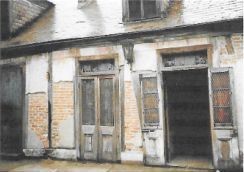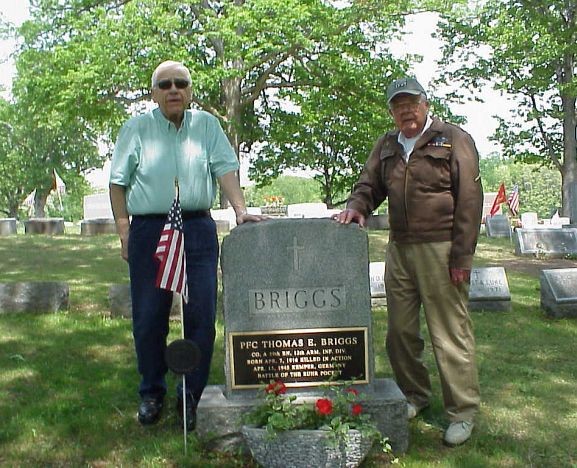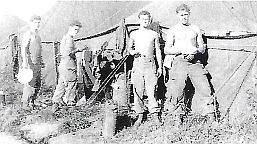I chose to title this story Anglesqueville because, while no longer the name for the town of Val
de Saane in Normandy, France, it was so named when A Company landed in France on January
29, 1945. A landing delayed by the 18 days it took us to get from New York to Le Havre, France.
18 days on a cramped, crowded dump of a Liberty Ship, more suited to hauling cattle than
troops, but, nonetheless, so used for us.
The 18 days in that Liberty Ship was not a happy experience. Only one that does not bear
repetition. Six layers of rope fastened canvas body holders, down two levels into a dark dank
hold. Bolted down every night. Listening to the thumps of depth charges, and thinking if one of
those U-boats gets us we’ll never be able to get out. Dodging the vomit of seasick soldiers
bunked above you. Sleep and rest were not a part of that experience. The only pleasure I got was
admiring the big battleship HMS Nelson that was directly in front of us in that endless convoy.
We, late in the evening of the 29th went by truck about 20 miles to the village of Anglesqueville
and were welcomed into our Billiard Parlor billet with a piping hot round of Calvados brandy
that warmed our stomachs from the chill of that cold January night. It set the stage for a whole
series of exciting adventures that I didn’t appreciate at the time, but when I look back I am
overwhelmed with their powerful meanings.
I have a whole set of separate stories that bring out all the excitement of those eight weeks we
spent there. For now, let’s just say that I learned a lot about the roads in Normandy when in
Anglesqueville. A knowledge that would come in handy when we were on our way back from
Europe. Actually, a grace that saved me from severe consequences. My other Anglesqueville
stories will be dealt with separately, but this life saving road knowledge was one of the most
important graces of the many I received in my 1945 service in Europe.
It came to me very vividly when Jean and I revisited Anglesqueville in 1978. We, at that time,
happened to be in France to shop the Paris Jewelry market, as a part of our expansion of Jean’s
Antique jewelry business. I took the opportunity to rent a car and drive up to Anglesqueville for
essentially the same purpose as my re-visitations of this 2017 trip. It took a long time to
find, as it had been renamed and no longer existed on a current map. By another of those many
interceding graces for which I have been excessively blessed, I was able, with the help of two
French Gendarmes, to find an old map and pinpoint its location. That is subject matter for
another story. But, let me continue by quoting a from a memoir I wrote at an earlier time:
We went straightaway to the old billiard parlor where the First Squad was billeted. It was in the
process of being remodeled but was still in recognizable condition. I started asking people
nearby if they knew any of the people I remembered from early 1945. The answers were always
no. One person, however directed me to a butcher shop up the road where the village Mayor
worked. I was told the Mayor had all the town records, and could help me.
The Mayor was a pleasant lady of about 45 years who owned the butcher shop but had not lived
in Anglesqueville in 1945. She did not know anyone I referred to her from that earlier time.
Every name I would tell her she would answer “mort” (dead). So, it would not be that I would
have any kind of reunion with my old friends from WWII.
 Billiard Parlor – Anglesqueville 1978
Billiard Parlor – Anglesqueville 1978
But among stories that I prefer to forget, these are the two I chose to be represented by the title:
Anglesqueville. That name no longer exists on maps, and is significant in that it, to my
mind, describes two memories I no longer wish to exist either.
Let me take you there…
The first, and most important of these two, is my memory of a German town in the Ruhr Pocket
battle – Kemper. It was where A Company and many other units of the 13th Armored Division
were severely attacked and lost many of our A Company buddies and our 13th Armored Division
family. My memory of Friday, April 13, 1945 was so mangled that I, as a result, had an almost
complete inability to accurately recall what happened. Fortunately, our Company Commanding
Officer, had the duty and ability to give an accurate account. In actuality, Steve and I as we
revisited the Ruhr Valley could not find, like as in Anglesqueville, any references to Kemper on
my map. For all intents and purposes, it too, no longer existed. Thanks be to God…
Here is Captain Ford’s summary of the battle at Kemper:
The following morning the three rifle platoons were given the mission of clearing the town of
enemy troops. This was accomplished by segregating all the civilians in an open field, thus
eliminating sniper fire from behind a white flag. The mission was completed at about 1400 when
the company was relieved by elements of the 97th Infantry Division. The company returned to the
assembly area and discovered the toll of the two-day battle. There was a total of 31 casualties, 9
killed and 22 wounded. One half-track completely destroyed and several others damaged.
The picture below shows Ron Briggs, son of PFC Thomas E. Briggs, killed in that destroyed
halftrack on Friday April 13, 1945 with me, at his father’s gravesite in Fulton, NY. Thomas was
one of the nine A Company soldiers killed at Kemper. Ron and I met on Memorial Day, 2015
and observed our respects to Thomas on that day.
 In that same terrible engagement my Platoon Leader, (father figure and good friend) TSgt. Eldon
In that same terrible engagement my Platoon Leader, (father figure and good friend) TSgt. Eldon
Miller was severely wounded in the leg and evacuated to a hospital in England. I never saw him
again. After the war, we did communicate several times over the telephone. All in all, a serious
and costly battle, for not only A Company, but many other units as well. A memory to be
forgotten, as was its place on our map.
My other better to be forgotten memory happened in Anglesqueville on the last two days before
we left Europe to go fight the Japanese. In both these better to be forgotten stories God graced
me. For that I give recognition and thanks. They are the reasons for these revisits and stories in
the first place. Being completely human, I, like many, am often vulnerable and unaware. He
loved me enough to overcome those faults and see to my survival.
Let me get to the specifics in this story.
We had arrived at our Port of Embarkation, Camp Old Gold around mid-July 1945. Old Gold
happened to be only around 15 miles from where we spent the first eight weeks after arriving in
France – for me the village of Anglesqueville.
Captain Ford had already left for the US, so he left one of our A Company Officers in charge. I
do not remember his name, but he allowed me and a few others to revisit the friends we had
made a few months earlier. The condition of our visit was that we be sure to catch a truck they
would send for us at around 5:00 PM that evening.
 Shaving at Camp Old Gold – July 1945
Shaving at Camp Old Gold – July 1945
(I’m at the far left)
I took up his offer and being of the nature I was, I placed it in a very distant
corner of my mind. I spent a large part of my day drinking that same Calvados brandy
that warmed our stomachs on our arrival in January. It was powerful stuff. So powerful
that when my truck arrived to take me back to Camp Old Gold, I was completely drunk
and out of it. The truck came and went. And my mind didn’t kick in until very late into
that same night. The reality of my circumstance finally reached my consciousness,
By then it was about 3:00 AM. My good fortune was found in an assignment I had in my
earlier days in Anglesqueville. I had volunteered to drive a 2-1/2-ton supply truck to
various warehouses in Normandy as supplies were unloaded from ships in LeHavre.
I learned all the roads.
Wow, did that knowledge come in handy. As soon as I realized that I needed to get back to
OldGold before morning roll call or I would be AWOL, my survival instinct took control. I had
no truck to pick me up, so I had to walk the 15 miles back to camp. So, salvation was partly
contained in my knowledge of the right roads back to the camp. The rest was by the Grace of
God. I had managed to walk within a few miles of the camp by roll call time. As I approached
Old Gold, a wrecking truck stopped and picked me up and dropped me off at A Company. But,
not soon enough to be present at roll call. But, fortunately in time to be loaded on the trucks
taking ud to our troopship home.
I was in big trouble. I was AWOL. I had to be punished, but by God’s Grace I didn’t miss the
boat. That would have been real trouble. I shudder to think about it. I did get punished, but only
minimally, and came home on a real troop ship. Eight days of smooth comfortable sleeping and
eating. A huge difference from our trip over.
The closest Steve and I got to Anglesqueville was when we arrived in Paris on July 14th –
Bastille Day. Close enough to remind me of the things I wanted to forget about my WWII
experience in Europe. We didn’t need to go there because I had already wiped my mind clean of
that disastrous experience that almost put me into complete oblivion.
My main interest in taking this return to the scene trip was for finding ways for, and finding of,
reconnection. Steve’s and my concluding story takes place in Ireland where the doors and
bridges for those connections that would effectively come into our view and we could see what
we wished to share with you. Those messages are in the last story titled: Skibbereen.